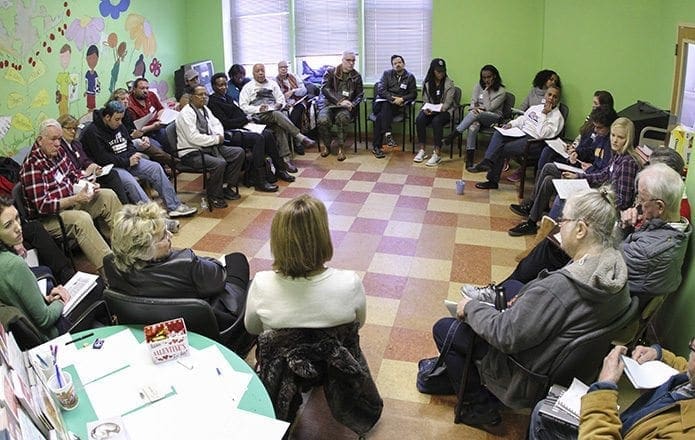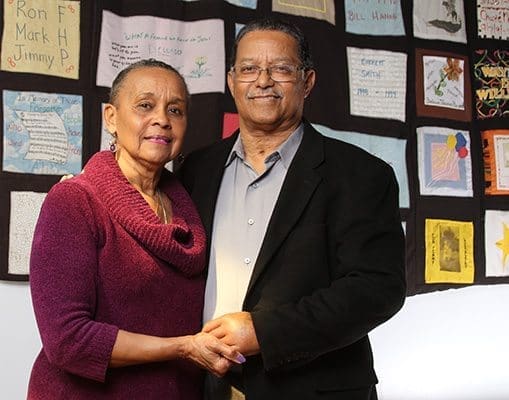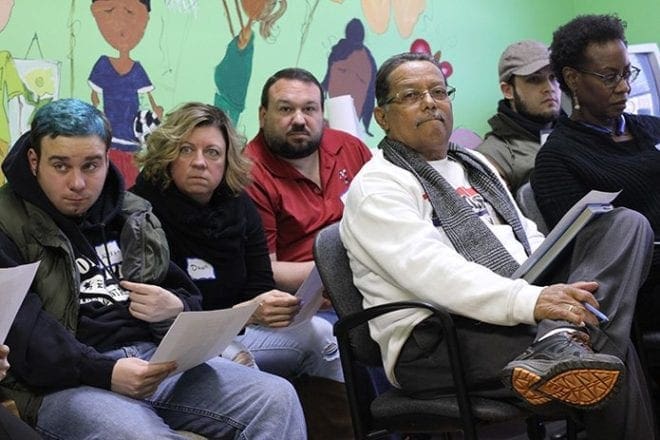 Photo By Michael Alexander
Photo By Michael AlexanderAtlanta
Lourdes group confronts racism with talk
By ANDREW NELSON, Staff Writer | Published April 28, 2016
ATLANTA—In a crowded room at Our Lady of Lourdes Church parish center on a recent Saturday morning, Gino Lloyd shared how the far-flung reach of Facebook, Twitter and social media has brought racism out of the shadows.
“It has let America see this is truly going on. In my corner, we knew it was going on,” said Lloyd, an African-American man.
This is not exactly a comfortable conversation topic. It never is at ERACE. Here the spotlight shines always on racial relations.
“ERACE is where people passionately discuss—without rancor or anger—a very difficult topic,” said Beatrice Soublet, who with her husband, Lawrence, began this twice-a-month community discussion 10 years ago.
“Our goal is to really better understand every aspect of racism,” said Lawrence Soublet. “The long-term goal is to get rid of racism.”

New Orleans natives Beatrice and Lawrence Soublet started the Atlanta chapter of ERACE at their parish, Our Lady of Lourdes Church, Atlanta, in March 2006, six months after moving up from New Orleans and nine months before they were married. In 1993 ERACE was formed in their hometown as an organization coalescing around ways, through communication, to diminish racism and “commit to treating fellow human beings of all colors with love and respect.” Photo By Michael Alexander
A growing share of Americans believes racism in the nation is a “big problem,” according to a Pew Research Center 2015 survey. About half of Americans agree with that statement versus 33 percent five years ago. Three-quarters of African-Americans agree racism is a big problem, while 44 percent of whites do.
So, in a time of polarizing presidential politics and while Black Lives Matter protests hold people’s attention, this conversation at Lourdes attracts a bigger crowd.
The Soublets brought the organization to Atlanta from New Orleans when they remade their lives here after Hurricane Katrina. Beatrice Soublet said she was drawn to the program initially to replicate the diversity in her classrooms when she taught in the early 1990s in Maryland. When she moved to New Orleans, she didn’t like how people seemed to only befriend people who looked like themselves, so she attended a local ERACE discussion, enjoyed it, and later became its leader.
“You have an obligation to right what is unjust,” said Beatrice, a retired teacher. “If you are up against a wall, you just chisel, chisel and chisel.”
Lawrence, with wire-rimmed glasses and a salt-and-pepper mustache, grew up in segregated New Orleans and a segregated Catholic Church.
“I’m talking about segregation where you are afraid of your physical safety going into white neighborhoods. You were taking your life in your hands. I’ve been conditioned to look out for racism. This is part of me,” he said.
“On the other side, I can see the big improvements. I can go to places I wouldn’t have in segregated days,” he continued. “I can see change. I’m sensitive to the fact that we have a long way to go. The little part I can play to get rid of the problem, I want to do that.”
“This group is so wonderful”
They wanted to recreate the organization in Atlanta and started at Our Lady of Lourdes, the mother church of the black Catholic community in Atlanta. Changing demographics in the Old Fourth Ward neighborhood and the influx of white Catholics favored the necessary mix for the project. It’s now been in place for a decade, and the Soublets continue with the mission.
On a recent Saturday, the group included more than a dozen men and women, evenly divided among blacks and whites. Sitting in chairs around the room, a university teacher, a writer, a banking analyst and retirees made up the group.
The 90-minute format focused on discussion. There are clear guidelines: no debate or derogatory terms. Participants read a current article on race as a springboard to share their thoughts without interruption. Listeners can ask for clarification but don’t have point-counterpoint debates.
A taste of New Orleans started the meeting in the former school classroom where there was a photo of Pope Francis on one wall and a colorful mural on another. A plate of pralines made in the Soublets’ kitchen welcomed the group.

(L-r) Alex Ham-Kucharski of Cumming, a first time attendee along with his mother Dawn and father Rich, Lawrence Soublet, co-founder of the Atlanta chapter of ERACE and a member of Our Lady of Lourdes Church, Atlanta, Luis Perez and Debra Lewis listen as someone makes a comment on the other side of the room. Photo by Michael Alexander
Lawrence Soublet passed out an opinion piece from The Guardian newspaper by Hari Ziyad about shocked reaction to the tone of the current political season when the reality of long-standing and unchanging racial disparities in health care, education and poverty rates is the real scandal.
The author wrote, “… right now, we frame the conversation about racism in American politics as represented by Trump as ‘shocking,’ ‘new’ or somehow vastly different than any previous iteration, when it is merely a different color lipstick for the same ugly pig.”
People added their thoughts. Some offered reflections on what they had read, while others answered questions asked on a handout Soublet provided. One person said social media has broken barriers that used to keep people at a “safe distance” from racist acts. Others said racial challenges will persist until there is a financial cost. Still another said changes will come when people’s hearts are changed.
Fifteen minutes after the meeting wrapped up, folks still chatted with each other before heading over to a nearby pizza shop for lunch.
Naomi Stuesser, a white woman who lives nearby in Grant Park, said she “grew up in a bubble” in the Midwest without a diversity of races. “I feel like I want to get to know my city. This is perfect, a good way to talk.”
John Laurich first attended at the invitation of a friend. He is in a biracial relationship and has been participating in ERACE for several years.
“As a white individual, I don’t feel I am as sensitive as I need to be,” Laurich said. What he may brush off as a crazy statement or behavior can cut members of his family deeply, he said.
He is hopeful about racial relations, but his extended family sees him as an optimist. They point out people don’t react to him with suspicion when he gets on a elevator or lock their car doors when he walks by, he said. “It runs deep. All of this runs very, very deep.”
“Camaraderie is a very good thing to me. This group is so wonderful. It is really, really enlightening. You are talking to people on a one-on-one basis. You are really talking. You can see people with all their flaws. No one is immune to this. It is just there,” Laurich said.
Dorothy Walker, a charter member, has been attending since the start of ERACE.
“It’s very respectful. That’s one thing that keeps me coming,” she said.
She said the format encourages people to talk without a raised voice. “I like to relate to people as humans. I will not ignore the fact that there are differences based on our (race). It’s healthy to hear opposing viewpoints. I like to listen because I learn.”
A member of Our Lady of Lourdes, Walker, an African-American woman, said her Catholic faith obligates her to treat others well. “I always want to treat others with respect, dignity and humanely.”
When an incident exposes racial conflict, there are calls for national conversation about race. Walker, however, thinks the time to talk is now.
“It isn’t like we need an incident to talk about race. We’re doing it,” she said. “It is something that is ongoing.”